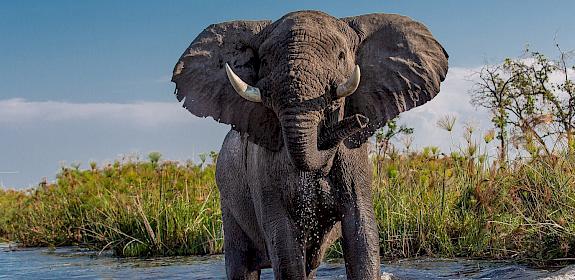Medicine practitioners urged to help reduce bear bile demand
Kuching, Sarawak, Malaysia 16th November 2012—“Traditional medicine practitioners have a crucial role to play in reducing the demand for bear bile and gallbladder that drives the illegal trade in South-East Asia’s bears,” TRAFFIC told delegates to the 9th World Congress of Chinese Medicine held in Kuching, Sarawak in Malaysia last week.

The Congress, one of the industry’s most important annual gatherings, serves as a platform for specialists from all over the world to present the latest developments in Chinese medicine. The theme of this year’s Congress was Traditional Chinese Medicine—contributing factor to the harmony of humans and nature.
Speaking at the Congress, TRAFFIC Deputy Regional Director in South-East Asia, Dr Chris R. Shepherd, described how TRAFFIC’s research had shown that continued demand for traditional medicines made from bear parts and derivatives posed a severe threat to wild bear populations in Asia.
Both bear species in South-East Asia—the Asian Black Bear Ursus thibetanus and Sun Bear Helarctos malayanus—are hunted, especially for their gallbladder, which contains bile—a key ingredient in some traditional medicines.
A 2011 TRAFFIC study, Pills, Powders, Vials & Flakes: The bear bile trade in Asia had shown such trade to be widespread, often carried out openly, despite it being illegal, and revealed that many of the farms supplying bear gallbladder and bile are stocking their facilities with wild-caught bears and not captive bred ones as often claimed.
Surveys have repeatedly found China to be the main source of the bear bile products on sale throughout South-East Asia. Such international trade in South-East Asian bears, and their parts and derivatives, is strictly prohibited by the Convention on International Trade in Endangered Species of Wild Fauna and Flora (CITES).
Both South-East Asian bear species are listed in Appendix I of the Convention, which prohibits international commercial trade. They are also both listed as Vulnerable by IUCN, because of their declining populations in the wild.
In September 2012, a Motion to phase out bear bile extraction facilities stocked with wild-caught bears was overwhelmingly passed at the IUCN World Conservation Congress, held in Jeju, South Korea.
The Motion also recommended Parties to CITES to implement fully the legislation to prevent illegal international trade in Asian Black and Sun Bears and products derived from them, and promote greater public awareness of these issues to reduce the demand for bear products.
“While the IUCN Motion is a step in the right direction, it is absolutely critical too that efforts be made to reduce greatly the demand for bear bile. In addition to increased enforcement efforts, active participation from the traditional medicine practitioners and retailers is essential to meet this goal,” said Shepherd.
TRAFFIC is also urging authorities to step up their efforts to shut down the illegal trade, and ensure those violating CITES and national legislations are penalized.
“There are legal herbal alternatives to bear bile – consumers need to be made aware of this and be persuaded to stop using medicine containing bear bile,” added Shepherd.




